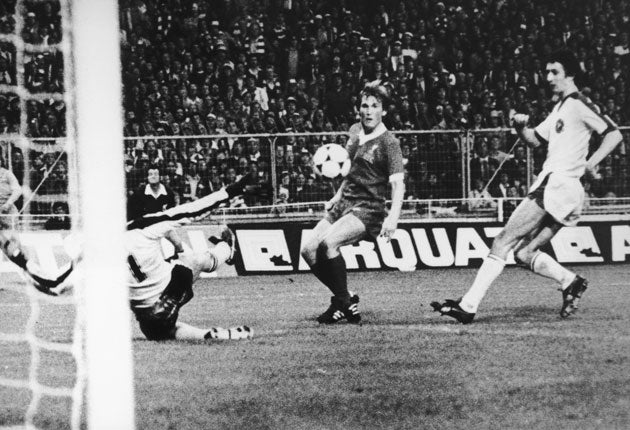Nothing justifies Wembley's description of itself as "The Venue of Legends" more than its staging of European Cup finals. Every team that lifted the trophy after the climb up the 39 steps was authentically great; from the Milan of Cesare Maldini and Giovanni Trapattoni to the Barcelona "Dream Team" fashioned by Johan Cruyff. That may be an omen for next Saturday's final, which sees perhaps the best football team in the world seek to overcome the club with an unquenchable will to win.
1963: Milan 2 Benfica 1
"All those steps," said Cesare Maldini, recalling his journey to receive the great trophy. When he lifted it aloft, it was the first time the European Cup had left the Iberian peninsula and, crucially, Milan had got there before Internazionale.
Wembley did not exactly embrace its first final. The Empire Stadium was less than half full and when a Milan supporter – wearing a suit, naturally – ran on to the pitch to celebrate the winner with Jose Altafini, the referee allowed him a hug and politely asked him to go back to the stands.
It was the match that began Milan's tradition of wearing all white in European Cup finals, although those who saw them barge past Dundee in the semi-final would hardly have called their conduct angelic.
Benfica were aiming for a third successive European Cup and took the lead through Eusebio's surging run before Altafini scored twice. They would lose two more finals before the decade was done.
1968: Manchester United 4 Benfica 1
Journey's end for Matt Busby. His team called him The Old Man and in the picture in which he embraces a sweat-stained Bobby Charlton while dissolving into tears, he looks ancient, despite the fact he was more than 10 years younger than Sir Alex Ferguson is now. United were convinced they would beat Benfica, whom they had crushed in the quarter-finals two years before. Because of an injury to right-back Adolfo, Benfica effectively had 10 men for most of the match. However, United began a tradition of cutting things very fine in European Cup finals; had Alex Stepney not saved wonderfully from Eusebio in the final minutes, there would have been no happy ending.
Eusebio applauded Stepney's save, then saw his team ripped apart in extra time. A decade after Munich, George Best, Brian Kidd and Bobby Charlton drove Manchester United into immortality.
1971: Ajax 2 Panathinaikos 0
A match that pitched Johan Cruyff against Ferenc Puskas, though sadly for fans of fantasy football the great Hungarian was in the dug-out, rather than on the turf. His triumph was in steering the Greek champions to Wembley. They had forced their way past Everton on away goals and come back from 4-1 down to beat Red Star Belgrade in the semis. But facing a young and hungry Ajax side who were on the very threshold of greatness was a match too far.
Two years before, Ajax had been too young and naïve when losing to Milan in the final; now it was Puskas's charges who were infected by nerves. "Going on the pitch, dealing with the press and the build-up were things we were used to," said Cruyff. "It was their first experience of it and it showed." Dick van Dijk – the footballer rather than the man with the worst Cockney accent in history – opened the scoring, and Ajax cruised.
1978: Liverpool 1 Bruges 0
The little chip that Kenny Dalglish directed over the Bruges keeper seems instinctive now but earlier in the match Dalglish had noted Birger Jensen committed himself a little early. He delayed his shot just fractionally.
That rather summed up the gulf in class. Bruges managed to overcome Juventus in the semi-final but were without their two best players, Paul Courant and Raoul Lambert, and seemed completely overawed by what was virtually a Liverpool home game. Bruges had one chance to score as Phil Thompson, who played because Tommy Smith had dropped a hammer on his foot, cleared off the line but they expected to lose and did.
On the morning of the match the only man who thought Liverpool might not win was Dalglish. Having retained the trophy, Graeme Souness ensured every one of his team-mates drowned in alcohol.
1992: Barcelona 1 Sampdoria 0
As clubs such as Nottingham Forest and PSV Eindhoven celebrated winning the European Cup, Barcelona endured a long, bitter wait. Six years after Terry Venables' side lost a dreary final in a penalty shoot-out to Steaua Bucharest, Barcelona, reformed under Cruyff, were determined this chance would not pass them by.
They faced a Sampdoria side that, with Roberto Mancini, Gianluca Vialli and Attilio Lombardo, were not short of talent, but Barça dominated. Hristo Stoichkov hit the post and they were seven minutes away from another shoot-out when Ronald Koeman drove home an unsaveable free-kick.
In the dug-out, Cruyff quietly prayed that Barcelona would not "lose their minds" in the final six minutes. They did not and the club vice-president, Joan Gaspart, celebrated by swimming in the Thames. On their return to Barcelona, one of Cruyff's young discoveries held up the trophy and shouted: "Citizens of Catalonia, here it is." His name: Pep Guardiola.
Subscribe to Independent Premium to bookmark this article
Want to bookmark your favourite articles and stories to read or reference later? Start your Independent Premium subscription today.


Join our commenting forum
Join thought-provoking conversations, follow other Independent readers and see their replies